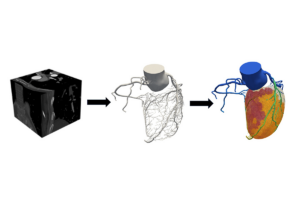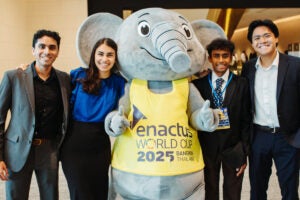Texas Engineers are creating a new community to unite civil engineers, cyberinfrastructure professionals and experts in artificial intelligence to better understand and protect our virtual and physical infrastructure.

Led by Krishna Kumar, assistant professor in the Cockrell School of Engineering’s Fariborz Maseeh Department of Civil, Architectural and Environmental Engineering, this new community aims to produce well-rounded software developers who can build applications specifically for civil engineering purposes, such as climate issues, natural hazards, construction automation, cybersecurity, and material discovery.
“We aspire to use AI to unlock the potential of data, accelerate simulations, build digital twins revolutionizing our approach to designing and building sustainable cities and tackling critical challenges,” said Kumar. “To do that we need to bring people with civil engineering expertise together with AI experts to learn from each other.”
Kumar and his team recently received a $7 million grant from the National Science Foundation’s Strengthen the Cyberinfrastructure Professionals Ecosystem (SCIPE) program for a community they are calling Chishiki.ai. The Chishiki.ai program will train 50 graduate students in the U.S. each year through fellowships, graduate funding and summer internships to support a new generation of cross-trained cyberinfrastructure professionals and engineers.
Natural disasters are among the first applications the group will tackle. They are working with DesignSafe, a collaborative project between the Cockrell School and Texas Advanced Computing Center (TACC), that developed a cyberinfrastructure platform for natural disaster information and simulation. DesignSafe has changed how planners, builders, policymakers and engineers prepare for and respond to hurricanes, tornadoes, earthquakes and more, but there is still more that can be done with the data it has curated.
“DesignSafe has released hundreds of TB of data from experiments, reconnaissance studies, and numerical simulations of natural hazards,” said Ellen Rathje professor of civil, architectural and environmental engineering and director of DesignSafe. “This vast and varied data is ripe to be exploited by AI and ML to better understand the impacts of natural hazard events. SCIPE aims to equip the next wave of civil engineers and cyberinfrastructure professionals to harness this potential.”
The Texas Advanced Computing Center will play an important role in Chishiki.ai, and its director, Dan Stanzione, is a co-leader on the grant. The researchers will develop AI models for hazard engineering related to DesignSafe, as well as developing foundational AI models for civil engineering on TACC systems. Training modules will be integrated with TACC to give students easy access.
The researchers are also working with Richard Knapper, director of Cornell University’s Center for Advanced Computing, to develop a virtual workshop, expanding the program beyond UT. The goal is to train more than 300,000 users globally on the Cornell Virtual Workshop learning platform.



